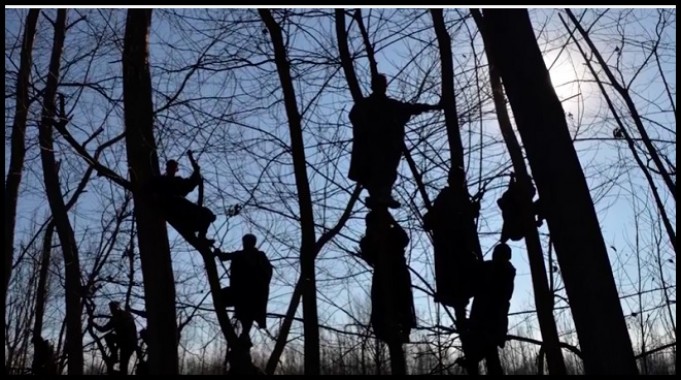Now, bans at Kerala’s Short Film Festival
A still from one of the banned films, 'In the Shade of the Fallen Chinar'.
The Union government’s decision to deny permission to the International Documentary & Short Film Festival of Kerala (IDSFFK) to screen documentaries on JNU, Rohith Vemula and Kashmir is likely to produce the opposite result of what it intended.
The Ministry of Information & Broadcasting (I&B) has denied permission to screen three movies: ‘March March March’ by Kathu Lukose, ‘The Unbearable Being of Lightness’ by Ramchandra PN, and ‘In the Shade of Fallen Chinar’, co-directed by Fazil Nc and Shawn Sebastian. The movies, respectively, discuss the JNU controversy, Rohith Vemula’s suicide and the Kashmir crisis.
The films have been selected for screening at the IDSFFK which will be held in Thiruvananthapuram during June 16-20. This is the 10th edition of the IDSFFK, organised annually by Kerala State Chalachithra Academy, an autonomous body under the state government’s Department of Cultural Affairs.
With many people having come out openly in support of the banned movies, they are likely to reach more audiences – the exact opposite of what the I&B Ministry intended. At least one movie is already online, with more than 44,000 viewers on YouTube.
The festival organisers said that the Ministry provided no reason for its decision. “The Ministry hasn’t cited any reason for denying censor exemption for these films, which are based on socially relevant themes,” said Kamal, the director of the festival.
Kamal, who is also a senior filmmaker, called this a ‘cultural emergency’ imposed by New Delhi.
The three directors also said they had no idea why permission had been denied. “I am not sure that those who have taken the decision have actually seen these films,” said Ramchandra, director of ‘The Unbearable Being of Lightness’.
Shawn Sebastian, co-director of ‘In the Shade of Fallen Chinar’, said he didn’t know which part of his movie the authorities had found “problematic”.
Notably all three films were to be screened in the ‘Competition’ category. While ‘In the Shade of Fallen Chinar’ and ‘March March March’ were shortlisted for the Competition in the Short Documentaries section, ‘The Unbearable Being of Lightness’ was selected for Competition in the Long Documentaries group.
“How many people would have seen the film at IDSFFK? Assuming that it is full capacity, maybe a maximum of 400-500. Why should anyone be insecure about this minuscule number?” asked Ramchandra.
Calling the government’s decision a “red herring”, he said: “You ban books, don’t allow films to be screened, appear to restrict people's food habits … people get ruffled … ruffled enough to forget that a Lokpal is not yet appointed, that a few huge family based companies owe large chunks to public banks, that gas got literally siphoned off mid sea, that coal that was imported for electricity was over-invoiced and that natural resources are milked by a few corporate companies leaving nothing for the future generation.”
When asked to briefly explain his movie in his own words, the director said the movie was on “a suicide letter, a few gazes and a shopping area”.
Sebastian said the decision to deny permission was “unexpected”. A Bangalore-based freelance journalist and documentary filmmaker, Sebastian also said he and Fazil Nc will approach the Kerala High Court immediately to try to overturn the Centre’s decision.
“Those subjects - JNU, Rohith and Kashmir - are something that the central government doesn't want anyone to discuss, to watch,” said Sebastian. “We tried to capture Kashmir through a different perspective, through the point of view of young Kashmiri artists whose lives have been caught in the middle of the conflict.”
The 16-minute film tries to capture the lives of Kashmiri students who are engaging with media or art - artists, photographers, journalists, musicians - and narrates how they live with the conflict in the region and how the conflict influences their works and lives.
The movie, which is available online, including on YouTube, was shot in Srinagar in June 2016, weeks before the killing of Burhan Wani and the subsequent eruption of widespread protests across the Valley.
While Kamal has written to the Ministry asking it to reconsider the decision, he said he is not optimistic about receiving a positive response.
Muhammed Sabith, formerly with Thejas, is an independent journalist and educator. He can be reached at sabith.muhemmad@gmail.com







